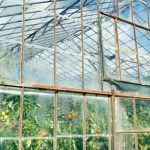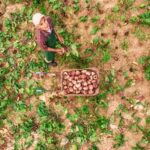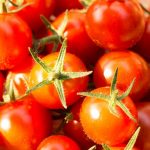Do squirrels damage vegetable gardens? Understanding the potential threat of these furry foragers is crucial for protecting your garden. Squirrels are known for their curiosity and resourcefulness, which can lead to significant damage to vegetable gardens if left unchecked. In this article, we will explore the behavior of squirrels in relation to vegetable gardens, assess the specific ways in which they can cause damage, and provide effective strategies for prevention.
Squirrels are notorious for their voracious appetite and keen sense of curiosity. Their affinity for digging, gnawing, and scavenging often leads them directly into vegetable gardens, where they can wreak havoc if not properly managed. Understanding their behavior and tendencies is the first step in mitigating any potential damage they may cause to your precious plants.
By identifying the specific ways in which squirrels can damage vegetable gardens, gardeners can take proactive measures to protect their yield. From feasting on tender shoots and fruits to uprooting seedlings in search of buried treasures, squirrels can pose a serious threat to the hard work invested in cultivating a beautiful and bountiful garden.
Identifying Squirrel Behavior
Squirrels are known for their agile and acrobatic behavior, which allows them to easily access vegetable gardens. They are highly active during the day, and spend a great deal of time foraging for food. Squirrels have a particular fondness for nuts, seeds, fruits, and vegetables, making them a potential threat to gardens.
In addition to their constant search for food, squirrels are also known for their habit of burying and hoarding excess food. This behavior is particularly relevant to vegetable gardens as they may bury seeds or damage crops while searching for places to stash their findings. As such, it’s important for gardeners to be aware of these natural tendencies when considering the impact of squirrels on their vegetable gardens.
Furthermore, squirrels are highly adaptable creatures that can quickly become comfortable in human environments. This means that they may become regular visitors to a garden once they have identified it as a reliable source of food. The ability of squirrels to quickly adapt and establish routines makes it crucial for gardeners to understand their behaviors in order to effectively manage any potential damage.
| Squirrel Behavior | Relevance |
|---|---|
| Foraging habits | Potential threat to vegetable gardens |
| Burying and hoarding food | Possibility of seed damage and crop destruction |
| Adaptability to human environments | Likelihood of repeated visits and established routines |
Damage Assessment
Squirrels can cause a variety of damage to vegetable gardens, making them a significant threat to gardeners. It is important to be aware of the specific ways in which squirrels can cause harm in order to effectively prevent and address any potential issues.
Seed Consumption
One of the primary ways in which squirrels can damage vegetable gardens is by consuming seeds. Squirrels are known for digging up freshly planted seeds in search of food, which can significantly impact the success of a garden. This behavior not only disrupts the planting process but also reduces the likelihood of successful germination and growth.
Harvest Damage
Squirrels are notorious for raiding vegetable gardens during harvest season. They have been known to munch on ripe fruits and vegetables such as tomatoes, strawberries, and corn, often causing irreparable damage. This can be frustrating for gardeners who have invested time and effort into cultivating their crops, only to have them damaged or stolen by squirrels.
Digging and Burrowing
In addition to consuming plants and produce, squirrels may also cause damage through their digging and burrowing behavior. Squirrels are known for digging up bulbs, tubers, and roots, which can disrupt the root systems of plants and lead to stunted growth or even plant death. Their burrowing activities can also disturb the soil structure and create unsightly holes in the garden.
Being aware of these potential sources of damage from squirrels is crucial for gardeners looking to protect their vegetable patches. By understanding how squirrels can impact a garden, individuals can take proactive measures to prevent damage before it occurs.
Prevention
Squirrels can be a significant threat to vegetable gardens, as they are known for their voracious appetite and ability to cause damage to crops. However, there are several effective strategies that gardeners can employ to prevent squirrel damage to their vegetable gardens.
One of the most important preventative measures is to create a barrier that will keep squirrels out of the garden area. This can be achieved by installing fencing around the perimeter of the garden, making sure that it extends both above and below ground level. Another option is to use wire mesh or netting to cover individual plants or rows of crops, preventing squirrels from accessing them.
In addition to physical barriers, there are also natural deterrents that can help keep squirrels away from vegetable gardens. Planting strong-smelling herbs such as mint, lavender, or garlic around the garden can act as a natural repellent for squirrels. Similarly, sprinkling cayenne pepper or garlic powder around the garden can help deter squirrels from entering the area.
Finally, commercial repellents are another option for preventing squirrel damage to vegetable gardens. There are several types of repellents available on the market, including sprays and granules that are designed specifically to deter squirrels. These products often utilize natural ingredients such as predator urine or hot pepper extract to discourage squirrels from approaching the garden area.
By implementing these effective strategies for preventing squirrel damage, gardeners can protect their vegetable gardens and ensure a bountiful harvest free from pesky squirrel interference.
Natural Deterrents
Squirrels can be a major source of frustration for many gardeners, as their habits and tendencies often lead to significant damage in vegetable gardens. While it may seem like an insurmountable challenge, there are several natural methods that can help keep these furry pests away from your precious crops.
One effective natural deterrent is the use of strong-smelling plants that squirrels tend to avoid. These include varieties such as daffodils, hyacinths, alliums, and fritillarias. By incorporating these plants into your garden, you can create a natural barrier that may discourage squirrels from venturing too close to your vegetables.
Another natural method for deterring squirrels is the use of predator urine. Many garden centers offer predator urine in liquid or granule form, and its scent can help frighten off squirrels. Predator urine can be strategically placed around the perimeter of the garden or near vulnerable plants to create a protective barrier.
Finally, consider adding physical deterrents such as bird feeders or birdbaths to your garden space. Squirrels are often deterred by the presence of birds, and providing attractive features for our feathered friends can help distract squirrels from your vegetables.
As you implement these natural methods for keeping squirrels away from your vegetable garden, remember that it may take some trial and error to find the most effective solution for your specific area and squirrel population. By combining different tactics and staying persistent in your efforts, you can create a more squirrel-resistant environment for your prized vegetables.
Physical Barriers
Types of Physical Barriers
There are several types of physical barriers that can be employed to protect vegetable gardens from squirrels. One popular option is the use of chicken wire or hardware cloth. These materials can be used to create fencing around the garden area, as well as to cover individual plants or rows of crops. Another effective physical barrier is the installation of netting over the entire garden, which can prevent squirrels from accessing the plants.
Installation and Maintenance
When installing physical barriers, it is important to ensure that they are secure and properly maintained. Fencing should be buried several inches into the ground to prevent squirrels from burrowing underneath it, and netting should be taut and free from any tears or holes. Regular inspections and repairs may be necessary to keep the barriers effective over time.
Considerations for Effectiveness
While physical barriers can be highly effective in preventing squirrel damage to vegetable gardens, there are some factors to consider for maximum effectiveness. It’s crucial to make sure that any openings or gaps in the barriers are sealed off, as squirrels are adept at finding even small entry points. Additionally, consideration should be given to how easily accessible food sources are in neighboring areas, as this can influence squirrel behavior and their determination in trying to access the garden.
Repellents
Squirrels can be persistent pests in vegetable gardens, causing damage to crops and frustrating gardeners. One method for deterring squirrels from vegetable gardens is the use of commercial repellents. These repellents are designed to discourage squirrels from entering the garden and damaging plants.
Some common types of commercial repellents include sprays, granules, and electronic devices. Many of these products contain natural ingredients such as pepper, garlic, or predator urine that create an unpleasant odor for squirrels. The idea is that the strong scent will be repulsive to the squirrels and encourage them to stay away from the treated area.
It’s important to note that the effectiveness of commercial repellents can vary depending on a number of factors, including the specific product used, the size of the garden, and the persistence of the squirrel population. Additionally, while some gardeners have reported success with certain repellents, others may find that their results are less consistent. It’s also worth considering that some repellents may need to be reapplied regularly for maximum effectiveness.
| Types of Commercial Repellents | Effectiveness |
|---|---|
| Sprays | Varies depending on product and application frequency |
| Granules | May need regular reapplication; effectiveness varies by brand |
| Electronic Devices | Effectiveness depends on placement and coverage area |
As with any pest control method, it’s important to weigh the potential benefits against any possible drawbacks or limitations. When using commercial repellents in a vegetable garden, it’s also essential to carefully follow the instructions provided by the manufacturer for safe and effective application. By considering all available options for deterring squirrels from vegetable gardens, gardeners can take proactive steps to protect their crops from unwanted wildlife interference.
Conclusion
In conclusion, while squirrels can indeed cause damage to vegetable gardens, there are effective ways to prevent and deter them from wreaking havoc. By understanding squirrel behavior and implementing the right strategies, gardeners can protect their crops and enjoy a bountiful harvest without the threat of squirrel damage.
It is important for gardeners to be proactive in identifying squirrel behavior and recognizing the signs of damage in order to take appropriate measures. From natural deterrents such as planting certain types of flowers or herbs that repel squirrels, to physical barriers like fences or netting, there are various methods that can be employed to keep these furry pests at bay.
It’s also worth noting that commercial repellents can be a viable option for those who are dealing with persistent squirrel issues in their vegetable gardens. However, it’s crucial to carefully research and select repellents that are safe for both the plants and the environment. By being informed and prepared, gardeners can successfully protect their vegetable gardens from squirrel damage and enjoy the fruits of their labor.
Frequently Asked Questions
How Do I Protect My Vegetable Garden From Squirrels?
Protecting a vegetable garden from squirrels can be done by installing physical barriers such as wire mesh or fences around the garden area. Utilizing scare tactics like motion-activated sprinklers or noise-making devices can also deter squirrels from entering the garden.
Harvesting crops promptly and keeping the garden area clean of fallen fruits and vegetables can reduce the attraction for squirrels.
What Vegetable Plants Are Resistant to Squirrels?
Some vegetable plants that are more resistant to squirrel damage include hot peppers, onions, garlic, squash, and tomatoes. These plants have natural compounds or textures that squirrels find unappealing, making them less likely to be targeted by these animals.
How Do Farmers Keep Squirrels Away?
Farmers use a variety of methods to keep squirrels away from their crops, including using visual deterrents such as shiny objects or scarecrows. Implementing exclusion techniques like covering crops with netting or fencing off large agricultural areas helps prevent squirrel intrusion. Additionally, some farmers may use repellents – either natural or commercially available – to discourage squirrels from feeding on their crops.

If you’re looking to get into vegetable gardening, or are just looking for some tips on how to make your current garden better, then you’ve come to the right place! My name is Ethel and I have been gardening for years. In this blog, I’m going to share with you some of my best tips on how to create a successful vegetable garden.





